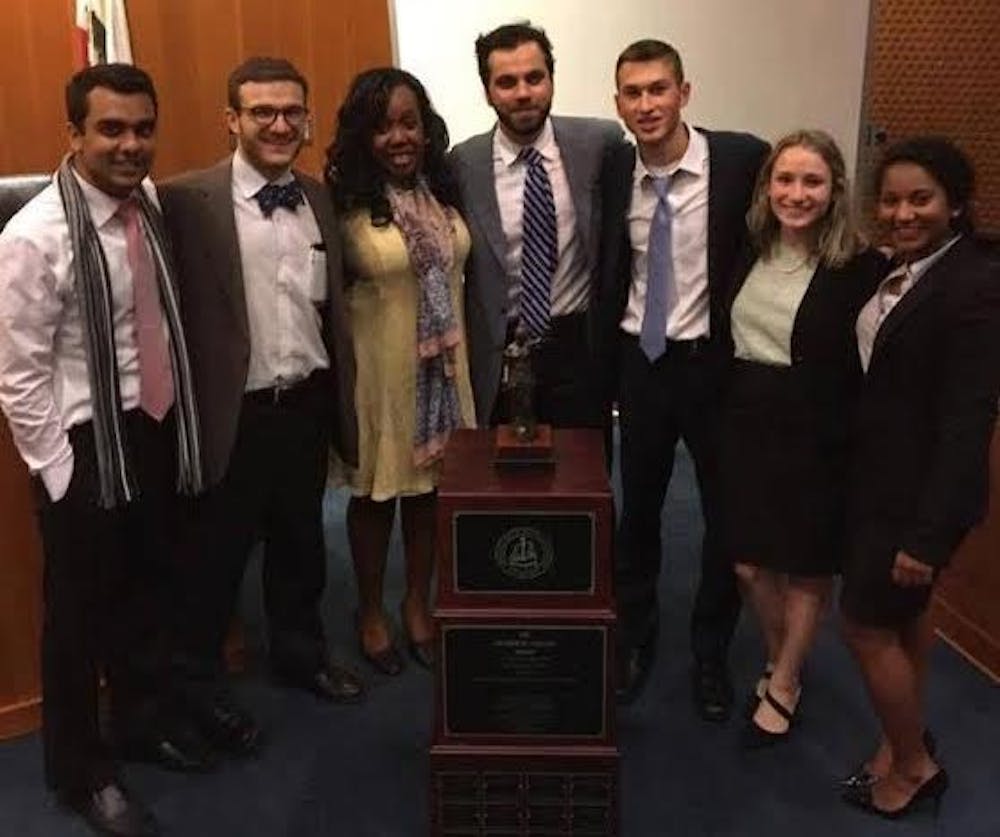After making it to the final round of the national competition for the second year in a row, the Virginia Mock Trial team won the national championship by defeating Yale University, the same college the team lost to in the final round last year. The competition was held in Los Angeles last weekend.
In addition to winning the national competition, four members of the team were honored as All-American attorneys or witnesses — first-year College student Lily Brock, second-year College student Sabrina Grandhi, fourth-year College student Darby Hobbs and fourth-year College student Allie Piacenti.
The team consists of seven competitors and is coached by Law Prof. Toby Heytens.
Fourth-year college student DeAnza Cook described the moment they heard they won as “pure bliss.”
“I guess I was really relieved, because all the work and all the good and bad was built up towards this moment,” Cook said. “We were so close last year, and to accomplish it this year was just such a treat to be a part of that.”
The American Mock Trial Association held the first round of the collegiate tournament in February. About 600 teams entered the regional competition, which decreased to 192 teams at super-regionals and 48 at the national championship tournament. The top two teams at the national tournament compete in the final round for the title. Other universities among the competitors included Harvard University, Columbia University, Duke University and the University of Michigan.
Before beginning the national competition, the University’s team partook in several invitational competitions. Schools are given one case to use throughout their invitational competitions, which allows them the opportunity to improve their approach. However, the process changes for nationals, making the competition even more intense.
“Once you qualify for nationals, what they do is they take 48 teams and give them a brand new case,” fourth-year Commerce student Shray Gupta said. “They only have about three weeks to prepare for nationals — that’s an extremely intense process … With that [invitationals] case, you can play around with it. You continuously change your approach and reevaluate, whereas for nationals, you have one shot.”
Gupta said a typical competition consists of four rounds with four separate schools in which one school represents the prosecution and the other the defense. The teams switch after the round is completed.
“There’s an element of theater to it,” Gupta said. “There’s an element of critical thinking, analysis and creativity. When you’re out there in front of the jury, you need to tell a story. You need to take complicated facts, complicated law and boil it down to something is a cleaner, compelling story.”
Cook said the preparation for competition is very intense but is beneficial during competitions. In order to prepare, the team reviews and memorizes the material and participates in intra-program scrimmages at the Law School.
“There were a lot of back-to-back practices,” Cook said. “It was fun because you know you are preparing for the biggest competition of the year and you are willing to sacrifice that time.”
Correction: This article has been updated to clarify the American Mock Trial Association tournament structure. The article previously said there were 48 teams at super-regionals when 192 teams qualified for super-regionals. Forty-eight teams attended the national championship tournament.







